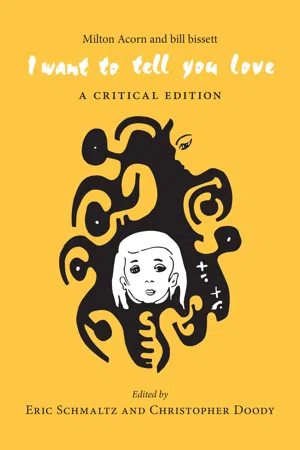
I Want to Tell You Love
A Critical Edition
- 260 pages
- English
- ePUB (mobile friendly)
- Available on iOS & Android
I Want to Tell You Love
A Critical Edition
About this book
bill bissett and Milton Acorn are two of Canada's most significant, and most controversial, literary figures. In the 1960s, bissett's renown as an experimental poet was growing as his social and political concerns were stirred by the voice of the counterculture. Acorn, inspired by socialist theory and imagism, was building his reputation as a poet on the margin who ran against the grain of the literary establishment. Both were rising towards cultural prominence—one, a true beatnik and the other, a certifiably rugged lyric poet. In 1965 they came together in a remarkable collaboration, a challenge to the established literary tradition and a call for a better world.
Published for the very first time, I Want to Tell You Love is the combination of bissett and Acorn's seemingly incongruous poetics to confront the turbulent and swiftly changing world of the 1960s. A collection of poems and illustrations, it is a window into the lives and motivations of two soon-to-be-canonized cultural figures. I Want to Tell You Love is a work of friendship, a shared vision of resistance, and a mutual longing for a better world.
This critical edition offers the manuscript in its intended form alongside contextualizing scholarship in a significant contribution to literary history. I Want to Tell You Love offers an opportunity to reevaluate the nature and scope of Canadian poetry during a critical time of national cultural awakening.
Frequently asked questions
- Essential is ideal for learners and professionals who enjoy exploring a wide range of subjects. Access the Essential Library with 800,000+ trusted titles and best-sellers across business, personal growth, and the humanities. Includes unlimited reading time and Standard Read Aloud voice.
- Complete: Perfect for advanced learners and researchers needing full, unrestricted access. Unlock 1.4M+ books across hundreds of subjects, including academic and specialized titles. The Complete Plan also includes advanced features like Premium Read Aloud and Research Assistant.
Please note we cannot support devices running on iOS 13 and Android 7 or earlier. Learn more about using the app.
Information
Contents
An Interview with bill bissett
Critical Introduction
Table of contents
- vContents